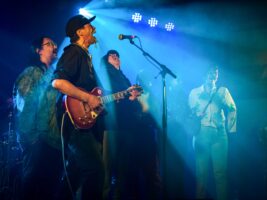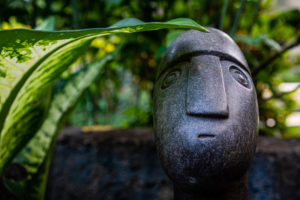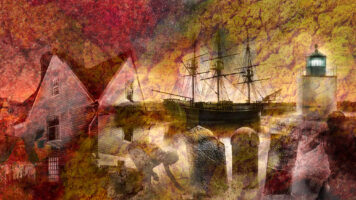Support Hidden Compass
Our articles are crafted by humans (not generative AI). Support Team Human with a contribution!
We were 15 miles or more off the highway when I woke up in our Chevy Express to the sound of water dripping. My husband, Gresham, was still asleep. I crawled over him and opened the door to find snow pouring down at a blinding rate.
Dawn hadn’t yet broken, but already a thick coat of snow covered the ground, the van, and the picnic table. When we’d parked to camp the night before, while the sun still shone, we knew a winter storm was forecasted, but we didn’t think it would come this far south.
We’d been warned. An hour or so before we got off the highway and entered the Springtime Campground in New Mexico’s Cibola National Forest — and about three weeks into our version of the Great American Road Trip — we’d stopped at a defunct gas station in search of engine oil.
Alongside its tandem cafe, the place seemed trapped in another time, dimly lit by the late afternoon sun, which was just beginning its descent, gently slipping through the blinds on its way down. The cafe was closed, and the gas station shelves were mostly empty, save for a few bags of chips and Ho Hos long past their expiration date. Everything had the hue of decay. An attendant with mousy brown hair piled in a haphazard bun stared at me with heavy eyeliner caked in the creases beneath her blue gaze.
She had no oil, she told me. And as we turned to walk out, I recall her saying, “There’s some heavy wind today, and you have to drive through two canyons on the way to Truth or Consequences. Be careful out there; there’s a blizzard blowing in.”
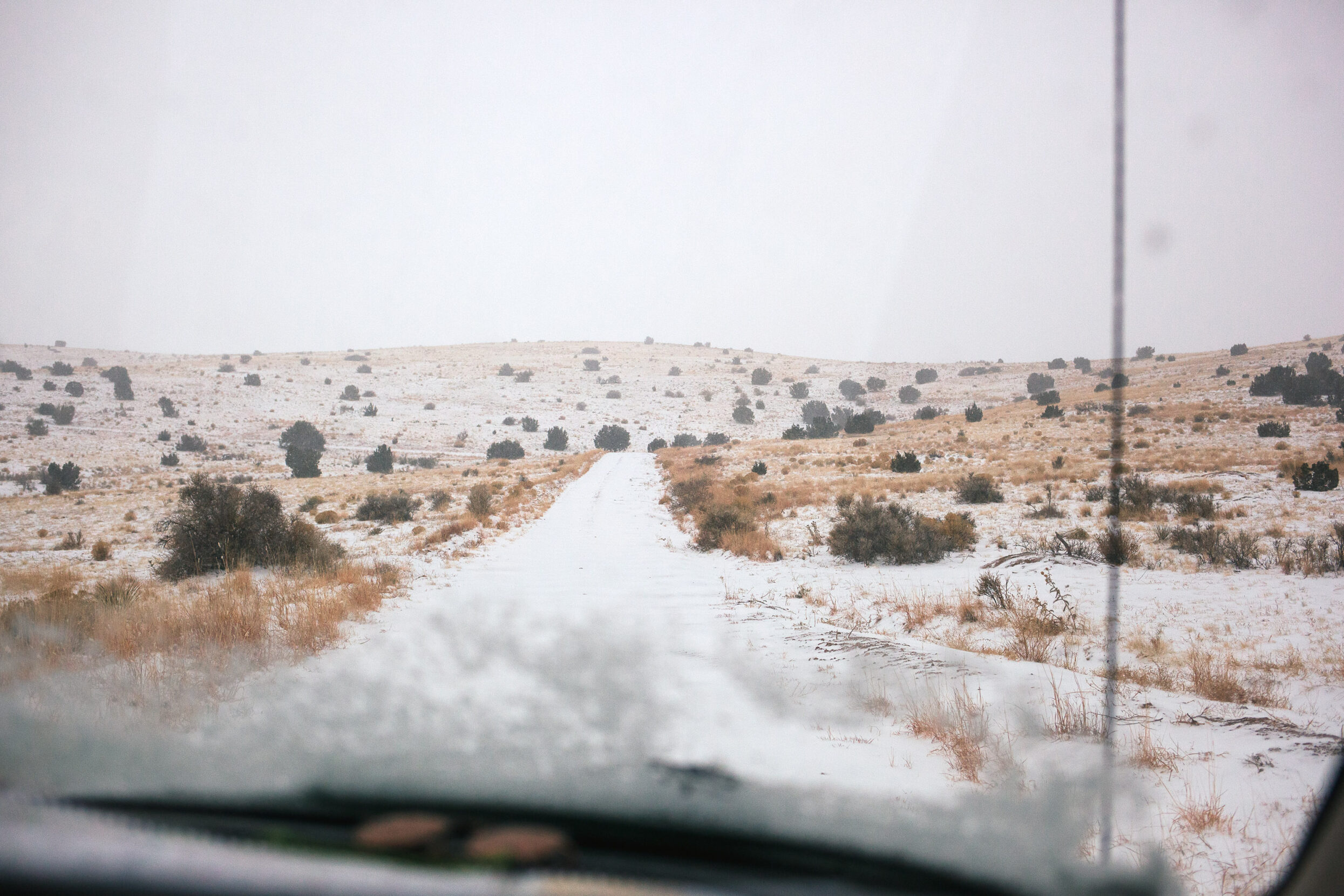
When author Jodi Cash and her husband, Gresham Cash, embarked on a road trip in January 2021, the landscape they traversed was in the dead of winter — in more ways than one. Photo: Jodi Cash.
~~
The call of the open road was something that always united Gresham and me.
Early in our dating experience, I learned we did our best talking when he had his eyes on the road and hands on the wheel. We’d pull out of Athens, Georgia, where we met as grad students, and we’d drive toward the North Georgia Mountains. We rarely had a specific destination in mind, just the sensation that the road winding ahead of us meant more time together on our own little path.
But for all of our love of the road, I never expected we’d begin our longest road trip yet in the winter of 2021. At that point, Gresham and I were totally uprooted. The year prior, we’d moved from Atlanta to Barcelona and gotten caught in the Spanish COVID lockdown.
Confined to our apartment for nearly 60 days, able only to leave for groceries, emergencies, or to take out the trash, I’d lie on our balcony, watch the neighbors, and dream about driving out of that city to anywhere. With the lockdown, I had plenty of space to think about what it means to be an American so far from home. And a longing for the open road felt like an essential part of it.
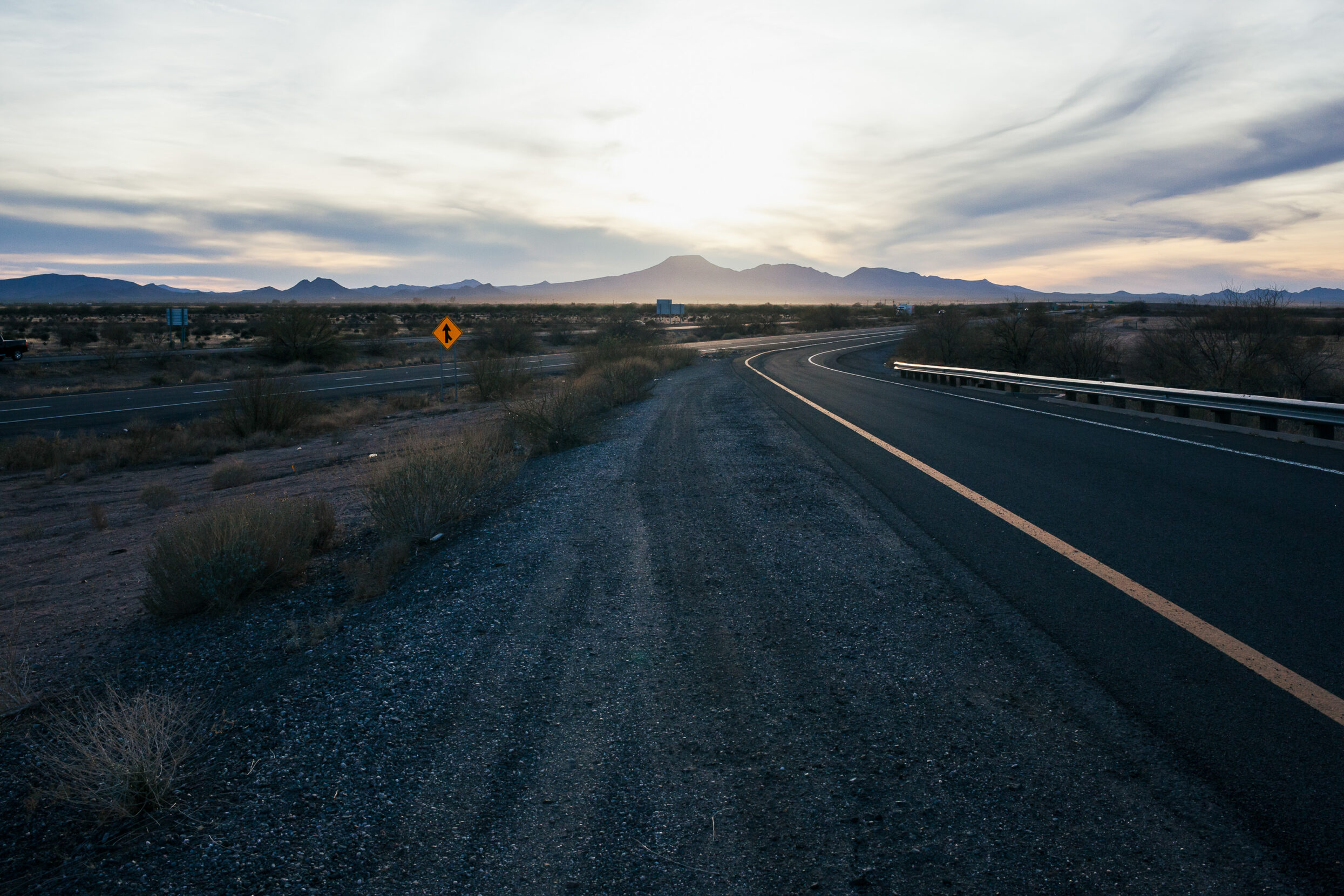
What does it mean to traverse the open road? Away from the U.S. during the early days of the COVID-19 pandemic, Jodi found herself longing for an American cultural experience. Photo: Jodi Cash.
As COVID measures loosened in Barcelona during the summer of 2020, we hiked Montserrat with our Mallorcan friend Dionis. He told us about a theory that everyone inevitably experiences life as the center of their own universe.
When Spain’s federal state of emergency ended and we returned stateside, I couldn’t wait to get back in the car. After all, I thought our time back home would be brief, and then we’d return to the distinct romance of European transit: trains, bikes, and endless walking. But in the meantime, Gresham and I would go drive for a bit.
~~
The expanses between us can be extraordinary.
The allure of the open road is deeply cultural in the U.S. In 1921, after he and his new wife completed a cross-country drive, Cornelius Vanderbilt Jr. speculated that the car would democratize travel in America. On his own 19-week-long trip west, he found himself encountering Americans of all kinds, and he theorized that this possibility, as well as the means to see more of the country, would help us better understand one another. But it wasn’t until after World War II that his vision was realized more broadly (and not just by those with last names like Vanderbilt). In that time, cars became more affordable with a new boom of military-motivated technology and post-war prosperity. And as other nations invested in re-outfitting and expanding rail lines post-war, Dwight D. Eisenhower built interstate highways.
Driving across the country became part of our national heritage, celebrated in iconic books like Jack Kerouac’s On the Road and John Steinbeck’s Travels With Charley. It’s more than just the setting — it’s the subject of countless songs and movies. A mental image of Route 66 has been seared into our national imagination. And a longing to feel the wheels move beneath you seems nearly universal in this country.
It’s hard to know to what degree the open road comforts me because of this heritage versus my upbringing.
My dad’s life as a musician kept him on the road. And after he and my mom divorced when I was young, his life zigzagged even more erratically from one gig to the next. I think my sister and I spent more time in the car with him than anywhere else, as he drove us from Fort White or St. Augustine, Florida, up to Atlanta, or later to and from Nashville.
He had a lot of tricks to keep us entertained. (And by “entertained,” I mean distracted from the discomfort of whatever POS car he’d bought from somebody in AA — most notably his 1970 Ford Maverick, which didn’t have heating, air conditioning, radio, or a passenger-side window.) He sang songs, imitating each iconic voice in “Highwayman” or “Pancho and Lefty.” We played this game (which I thought he made up) called “The Minister’s Cat,” in which you describe the eponymous cat using adjectives in alphabetical order. We hit the drive-thru at Steak ’n Shake. He told us more than children should know about his love life, financial troubles, band dramas, and wild youth.
And when the fumes he could barely afford finally gave out, or he took a wrong turn and drove back to the state we came from, or his car inevitably broke down, we pulled over on the side of the road and played catch until his best friend Stacy showed up to get us going again.
It was because of my dad that we were preparing for that road trip in 2021. And, actually, part of him would come with us.
~~
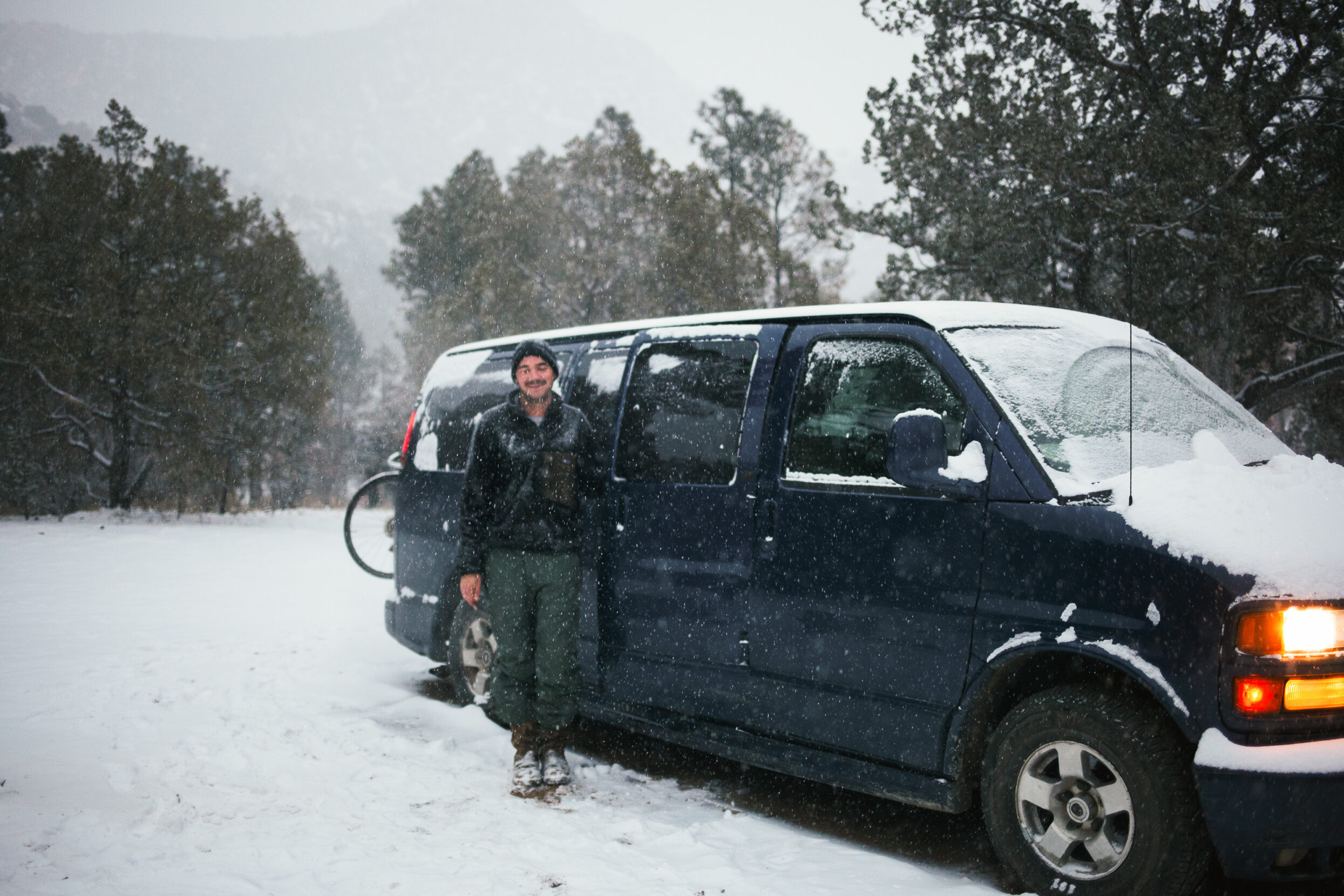
The author’s husband, Gresham, and their van, “Big Blue,” in the midst of a blizzard. Photo: Jodi Cash.
Like my dad, Gresham is a supremely gifted musician. He’s brilliant, sensitive, critical, and generous — qualities so extreme in my dad that I wonder if they contributed to his early death. Although my dad got into much bigger trouble in his lifetime, he and Gresham shared a suspicion of the status quo and an aversion to traditional work structures. Both were born creative. Neither had ever met a stranger. My dad always called with stories of someone he’d met at a gig or on the street or in AA. Gresham seems to make a new friend at every park bench, fishing spot, or book shop. And perhaps most importantly, they could make me laugh more than anyone with their total irreverence, idiosyncrasies, and shamelessness.
The first time I laid eyes on Gresham, he lit his guitar on fire while playing onstage at a house party so raucous that I sincerely thought the building was going to collapse. In our very first conversation (when we finally crossed paths again a few months later), he boldly refused to acknowledge my maiden name, Murphy. Instead, he gave me his own last name and called me Jodi Cash. What seemed like a joke was actually prophetic. Under the guise of wildness, like my dad, Gresham could also see things before others could.
Unsurprisingly, my dad and Gresham didn’t always get along. Of course, my dad and I didn’t always get along either.
But when I got the call that my dad had died in December of 2020, Gresham knelt at my feet, clung to my legs, and wept with me.
~~
By January 2021, we had nowhere to turn but the road. Because of COVID, we didn’t want to stay with family. Because we thought we’d soon be making our way back to Spain, we didn’t want to rent long-term. Because we’d already left Atlanta, we didn’t want to go back.
From Spain, we found ourselves in Gulfport, Florida, a tiny town sandwiched between St. Petersburg and St. Pete Beach. Gresham’s impulse sailboat purchase off of Craigslist offered some temporary shelter, but it was too tight to live in for long.
What we had was our Chevy van, which we called “Big Blue.” It had seen Gresham’s former band Oak House through tours across the country, and it had hauled us to and from Atlanta and St. Pete over years of shooting our first documentary film. Gresham suggested it was time to load back up.
It was because of my dad that we were preparing for that road trip in 2021. And, actually, part of him would come with us.
Returning to the road was fitting: The last time we saw my dad, that previous fall, while stopping briefly in Florida, we told him how surprised we were to find ourselves missing American highways and interstates while living in Barcelona. Since we were now stateside again, and COVID made so many other things impossible, Gresham suggested we might as well go on a cross-country road trip from Gulfport to the West Coast. I didn’t think we’d really do it. My dad told us that if we did, he wanted to come with us.
In the end, only what he left me with did: a small wad of cash, an old guitar, and a third of his ashes.
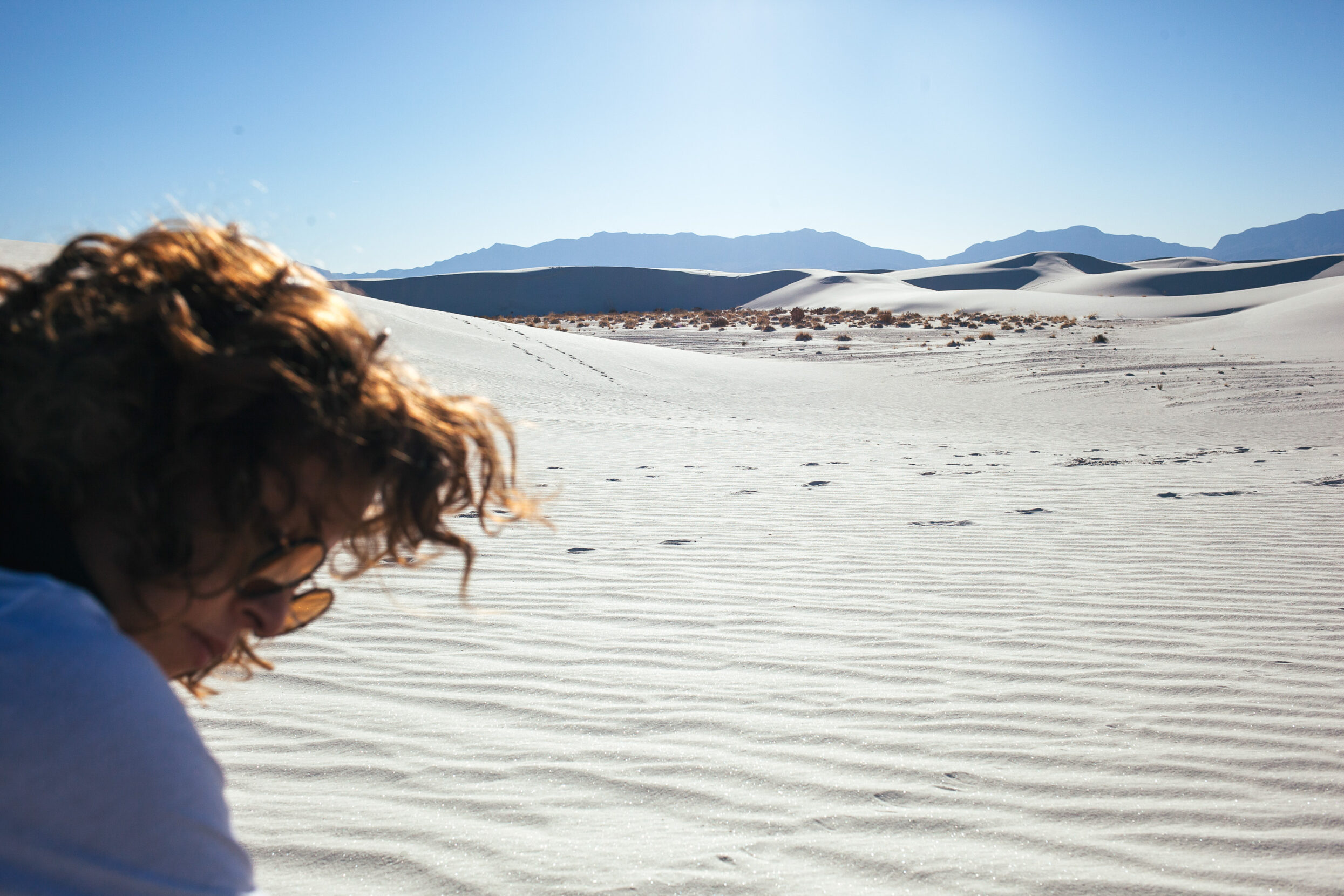
On her “Great American Roadtrip” Jodi Cash contemplates grief and promise. Photo: Gresham Cash.
~~
It was a jarring time to cross the country. We began our drive just weeks after the January 6th insurrection on the Capitol. For the first time in American history, our presidential transition was violent rather than peaceful. I wondered: How did we get here? I looked to the roads we traveled — how they connect and separate communities.
The American interstate system is, perhaps, at the root of our contemporary American duality — a facilitator of our dynamism and downfall. The same system that Eisenhower created with the National Interstate and Defense Highways Act of 1956 to promote interstate commerce and security destroyed the economic promise of the communities it paved over and divided — communities belonging largely to Black, brown, and Indigenous Americans, as well as other economically disadvantaged and marginalized people.
For some, the interstate created new American ideals, providing a sense of spaciousness and possibility outside of dense urban centers. It promoted suburbanization — and developers swooped in to sell us the dream of a stand-alone home and yard. But this was also a tool for de facto segregation, as upwardly mobile and financially flexible white Americans left cities in a wide-scale pattern of “white flight.”
Driving across the country became part of our national heritage.
~~
On the morning of January 30, 2021, I watched Gresham prepare us for the road. He loaded Big Blue up fastidiously with supplies he’d packaged into labeled bins: camp cookware, bedding, tools, books, hammocks, and headlamps. He stacked our clothes in suitcases. He rigged a pulley system to hang our coats (and provide privacy at campsites) and created a pallet for a bed. He packed a tiny rug to clean our feet as we got in and out of the van at camp, as well as collapsible furniture to extend our living space at stops across the country. He procured two 5-gallon jugs of water, fuel for our campstove, a tarp and more rope to keep us dry in whatever weather we might find. Bug spray, sunscreen, wool hats, scarves, and gloves. Into our cooler, he packed venison and rabbit meat he’d hunted and frozen the year before. He gathered maps and backup maps. Thanks to Gresham, we were ready.
But as we loaded into Big Blue, I’d never felt less like myself.
~~
Distance. While we covered more than 1,500 miles from Gulfport to Pensacola, Pensacola to Amarillo, Amarillo to Palo Duro Canyon, that sense of space took on new meaning.
Gautier. Canyon. Truth or Consequences. In these towns we passed through like spectators, it never took long to find people whose lives seemed less mobile.
Just a few weeks out from my dad’s death, I was consumed by grief, a depth of sadness I was fortunate never to know before. In a strange way, it made me feel like I understood my dad better than ever, as severe depression had haunted the latter years of his life. But now it was too late.
Even worse, I felt distance between Gresham and me, although he was just an arm’s reach away in the driver’s seat while I rode shotgun.
As we passed through our first destinations, I was a joyless shell of myself. Gresham was there, so it seemed, but I was somewhere else.
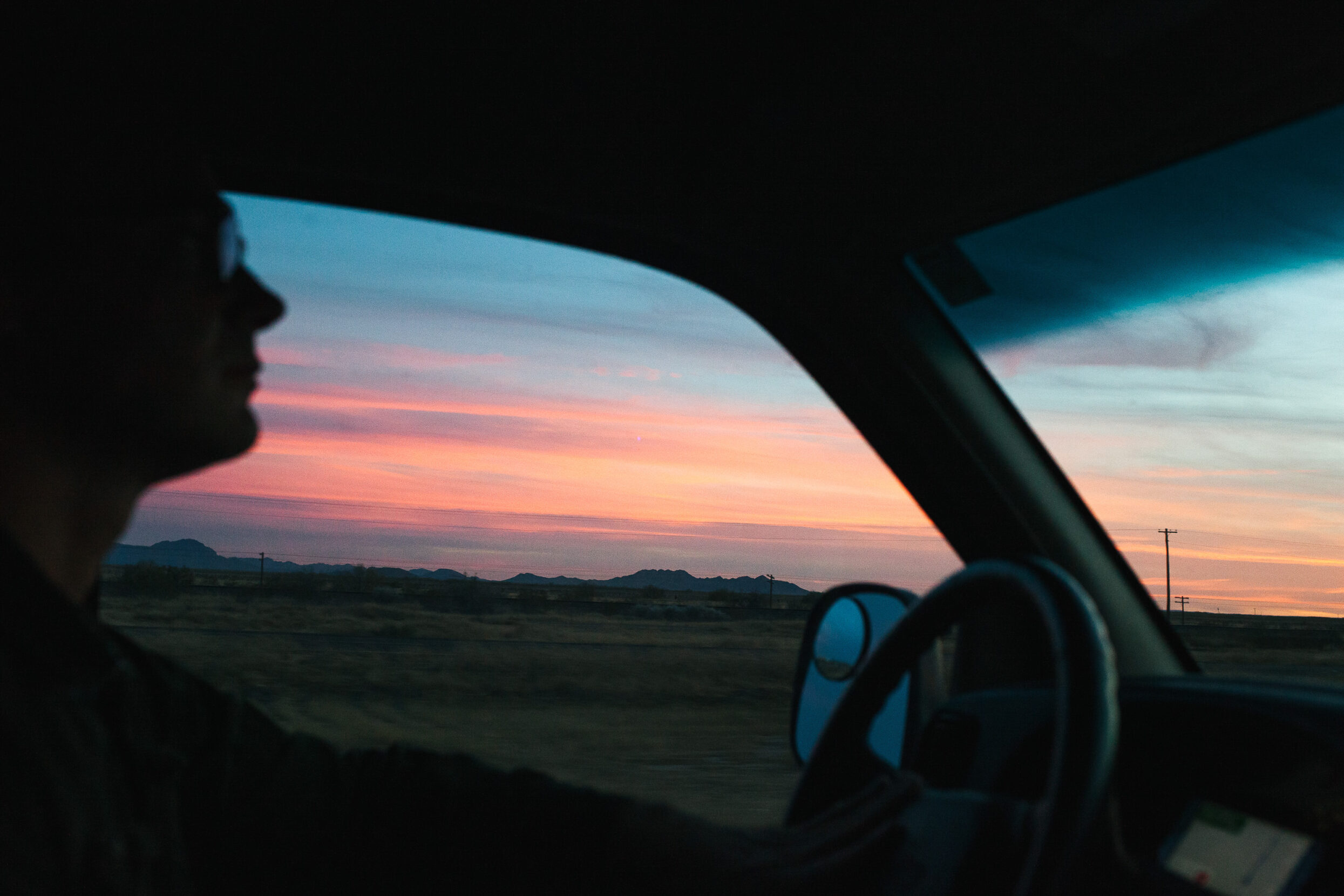
Undeterred, Gresham drives on, as the two pass through small towns in the midst of a pandemic. Photo: Jodi Cash.
~~
For those privileged enough to traverse them in relative safety, highways have meant choice and potential. But as the space between communities increased, so did political polarization. A 2015 study by Stanford social scientist Dr. Clayton Nall cited that the urban-suburban partisan polarization doubled after World War II and has continued to rise since the 1970s. Since that time, policymakers have perpetuated fear and ideological differences between those living inside and outside of urban centers — clinging onto their power by deliberately keeping us further apart from one another, not just in space but in spirit.
After driving across the country on his honeymoon, Cornelius Vanderbilt conjectured that the ability to travel the U.S. by car would connect Americans to one another. But it seems the opposite might be true.
The American road trip remains a promise unrealized. Driving in the name of contemplation, adventure, or even heartbreak requires having access to a car, the means to keep it running, the ability to take time away from work and other responsibilities, and a feeling of safety in strange communities. Yet even decades after The Negro Motorist Green Book sought to protect Black drivers in the Jim Crow era, many drivers of color still feel uneasy traversing the country.
But as our economy, culture, and policy developed to prioritize the car as our primary means of transportation, as if it were universally available, alternatives became sparse — and taking the train, bus, or hitchhiking offers a very different viewpoint than the one behind your own dash.
~~
Crushed as I was, I didn’t forget for a second how fortunate Gresham and I were to be doing what we were doing. I ebbed and flowed through the grey area between devastation and gratitude.
Meanwhile, there was still a pandemic going on. Cities, towns, canyons, and campsites felt wholly abandoned. Shuttered restaurants, abandoned playgrounds, empty town centers, and thousands of miles. In Santa Fe, tumbleweeds and saloon doors blew in the wind while dogs napped in the shade and cats scattered between trash cans in alleyways. We saw no one. Still, Gresham and I held hands and kept walking.
Even before we were alone on the road together, pandemic pragmatism meant Gresham was the only person who could be in my constant company. I was a thousand miles away in my mind, and still he drove us onwards from Santa Fe into the wilderness — refusing to let heartbreak derail our wandering.
Under the guise of wildness, like my dad, Gresham could also see things before others could.
As Gresham set up camp 15 miles off the highway in New Mexico’s Cibola National Forest, I took photo after photo of him while he revealed more surprises he’d stashed in our caravan. My body responded like a plant to the sun, growing and shifting to absorb more of it, to shake off that treacherous winter. Although the pleasure I felt was at best mechanical, photos felt like a breadcrumb trail I was leaving for my journey back to myself.
When Gresham packed our campsite back into the van for the night, an ominous wind descended, hard and heavy.
~~
The next morning, I could hardly believe how much snow the wind carried. I feared getting stuck in the blizzard, miles off the highway on an unsuspecting dirt road. I imagined how long it might take for anyone to find us.
I woke Gresham up just as daylight was beginning to break — hazy and slight through the thick snow. We rolled up our sleeping bags in the back of the van, checked to make sure our water supply hadn’t frozen, scraped snow and ice from the windshield and windows, and I touched the box containing my dad’s ashes for luck, feeling watched over, as we set out toward the highway.
That morning, as the blizzard drove down in sheets across Southern New Mexico, we drove on. We laughed while we passed cows covered with snow and prayed the wheels would keep turning. My dad’s wooden cross necklace swung back and forth from the rearview mirror, our road dog talisman. I felt alive again for the first time in months.

In a season of grief and uncertainty, the author finds her way back to herself on the open road. Photo: Gresham Cash.
We made it to Deming, New Mexico. Standing in the blizzard in the parking lot of an O’Reilly Auto Parts, we threw buckets of water at our now-frozen engine and eventually got enough ice off to keep moving.
By the grace of God, we made it out of the storm to Tucson, Arizona. The sun was shining with total apathy to the winter storm wreaking havoc across the Southwest. Realizing it was Valentine’s Day, we treated ourselves to a motel room.
~~
As we continued across the country, the sky was so wide, the stars so vast, the mountains so huge. Great Sands. White Sands. Canyons, gorges, and plateaus. The landscape felt eternal, and the people? They were far, far away.

The spaciousness of U.S. landscapes like these sand dunes in the southwest (pictured) is dramatic and often a draw for tourists and residents alike. It can offer grand perspective — but also isolating distance. Photo: Jodi Cash.
Spaciousness is one of our country’s most dramatic features. A 2021 estimation speculated that only 3.6% of the continental U.S. is inhabited. In Nik Freeman’s famous 2014 Nobody Lives Here map, the designer visualized nearly 5 million U.S. census blocks where no one lives. That means that of the 11,078,300 census blocks surveyed, some 44% didn’t have even a single human inhabitant reported. And even for the occupied blocks, many have extremely sparse populations. All of which is to say: The expanses between us can be extraordinary.
But maybe these distances also make us crazy.
Saguaro National Park alone is enough to make you think you’ve lost your mind. Cacti tower as many as 12 meters tall, foreboding with their violent spines. We pulled in and set up camp in the blistering heat just 48 hours after surviving the blizzard. Bizarre; beautiful. I’ve never seen a place that seemed more inhospitable to human life — it felt a little like arriving on another planet.
After setting up camp and watching the sun set, a squat, red-faced, white-haired man named Patrick invited himself into our campsite. Drunkenly, he told us secrets: The country is connected by secret underground highways and monorail systems, with which the government can transport nuclear weapons. In those same tunnels, he claimed, the U.S. military had also defeated an army of aliens. But that didn’t stop other UFOs from arriving. Once, as he was driving home, he said, he noticed a fleet of spaceships flying above him. All of a sudden, his car shut off, and at the same moment, all the spaceships began rotating in perfect clockwise synchronicity. He was released from the forcefield, stunned. When he made it home to tell his wife, she kicked him out. The levels of interference, he said, were inexplicable. There had to be something out there.
The next morning, he apologized for the wild things he’d said, but, of course, he couldn’t remember what they were.
~~
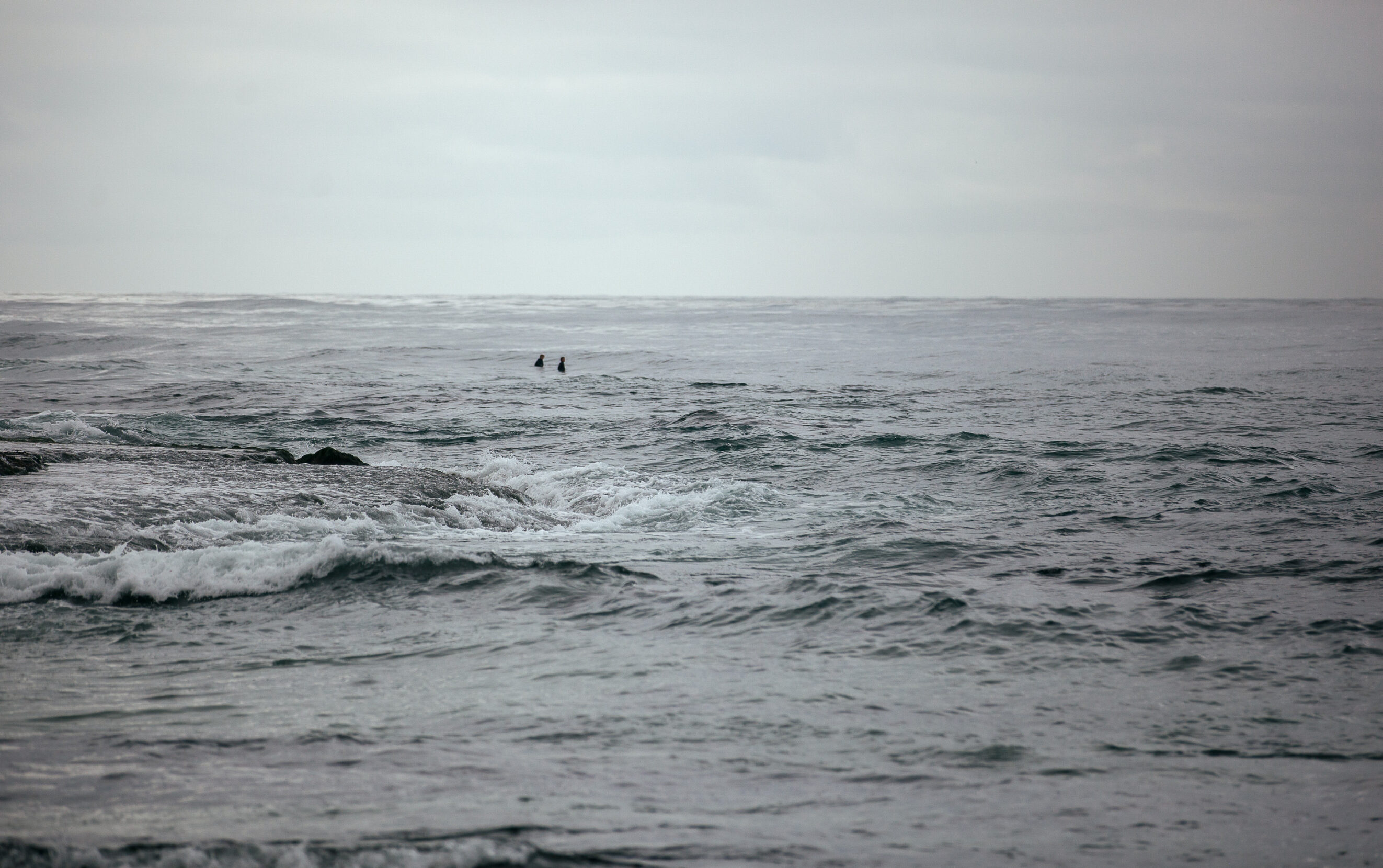
As their road trip reaches the Pacific, Jodi watches surfers in the early morning and contemplates the promise of the open road. Photo: Jodi Cash.
From the desert, we made it to the West Coast. We looked for the green flash. When the sun dips just below the ocean — if the conditions are just right — there’s a burst of green that’s gone just as soon as you see it. We watched surfers cruise into the beach, riding their boards on their bellies. They slept a few hours and then woke up before dawn the next morning to get back in.
Crossing a liminal space within myself and my own country during that strange winter, processing a profound personal loss and looking at the land we came from, things looked less binary than I once saw them. I thought not of Truth or Consequences but of truth and consequences. I thought of joy and suffering, the beauty of solitude and the tragedy of isolation. My dad is gone but still with me. The open road holds promise, but that promise has not been made just.
When we finally headed east again, I took photos of the full moon rising as Gresham drove, and the dark road glittered with light.
Jodi Cash
Jodi Cash is a writer and filmmaker from Atlanta living in Paris. She recently premiered her first feature-length documentary, “The Green Flash,” and is now on the hunt for her next big story.

